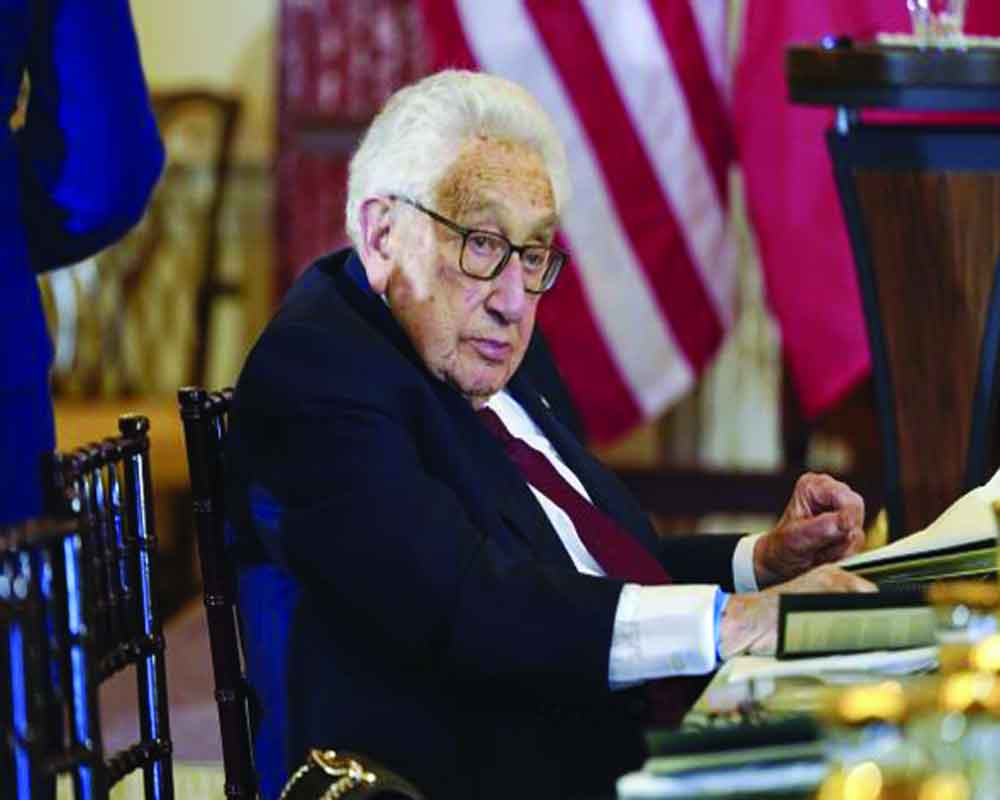While history will judge Henry Kissinger’s many accomplishments and misdemeanours, the art and science of diplomacy has lost an ace practitioner and innovator
Amongst the eulogies offered to the highest priest of realpolitik i.e., Henry Kissinger, and the accompanying divide on his unique style of diplomacy, the most prescient was from the former Prime Minister of Great Britain, Tony Blair, who said, “If it is possible for diplomacy, at its highest level, to be a form of art, Henry was an artistâ€. Admired as much for his intellectual clarity, as for his questionable morality and intent, the artist of diplomacy may have been the most famous soothsayer to many in power in the White House, but his legacy will remain deeply contested and polarising. No less than the sitting President of the United States, Joe Biden, himself conceded, “Throughout our careers, we often disagreed. And often strongly. But from that first briefing - his fierce intellect and profound strategic focus was evidentâ€.
Admittedly, diplomacy is not for idealists or even the fainthearted. The names of Machiavelli to Metternich are synonymous with statecraft which naturally entails a ruthless pursuit of self-interest, that can readily compromise which publicly maintained façade of values. Even the doyen of Indian treatise on politics and statecraft i.e., Chanakya realistically noted, “There is some self-interest behind every friendship. There is no friendship with self-interests. This is a bitter truthâ€. Naturally, the extent of moral compromises, leniencies and even suppressions done by Superpowers in their quest to assert their geopolitical agendas and interests, is even more pronounced.
As the definitive ‘Cold Warrior’ in the extreme freeze of the Cold War era, Kissinger personified contradictions between noble rhetoric with brutal manipulation and opportunism, to further the interests of the United States of America. Subcontinental memories are understandably rife with the wounds of deliberate indifference, uncouth behaviour, and even a clear tilt in favour of the oppressor (read, Pakistan) during the genocidal birth of Bangladesh – part of a far larger legacy of amorality that routinely manifested in supporting dictators, supporting suppression and partaking hypocritical conduct. But what remains undeniable is that Kissinger served American interests (often at the cost of other stakeholders and even purported ‘allies’) and institutionalised the way Washington DC would conduct diplomacy, thereafter.
Kissinger can claim to have singularly introduced the 19th Century German neologism of realpolitik, in diplomatic parlance and practice. If anything, it eased up the untenable stodginess of ideology or idealism, in favour of considerations based on realism, practicality and situational possibilities – which optimized the draw of hand to still deliver the most agreeable solution, given the situation. Many partook realpolitik like Zbigniew Brzezinski, Lee Kuan Yew, Deng Xiaoping to even Xi Jingping, but Kissinger is synonymous with realpolitik.
To that extent, it birthed subsequent concepts like ‘Strategic Ambiguity’, which implied remaining deliberately ambiguous towards operational and positional policies e.g., the implied commitment of the United States towards Taiwan, despite maintaining the ‘One China’ position. Even the much bandied ‘Strategic Independence/Autonomy’ deployed by India in recent times owes itself to the foundational principle of realpolitik, as it allows the practitioner to not get closeted within the linear grouping and associated puritanism of ‘allies’/blocs to which a sovereign subscribed. As India’s External Affairs Minister, S Jaishankar, quipped on the task for Indian diplomacy which may not have been possible to state earlier, “This is a time for us to engage America, manage China, cultivate Europe, reassure Russia, bring Japan into play, draw neighbours in, extend the neighbourhood, and expand traditional constituencies of support.†Contradictory at one level, given the ambition of keeping equations with America and Russia in the same breath, whilst the backdrop of the Ukraine War ensued, a clear reflection of practicality triumphing binarism, in an ode to principals of realpolitik as popularised by Kissinger.
Another attributed facet of modern-day diplomacy to Henry Kissinger was the decidedly more moral role of ‘back-channeler’ amongst the seemingly intractable stakeholders. Kissinger had famously flown secretly to China in July 1971 to restore and repair relations with America, something he did yet again, just a few months back at the ripe age of 100 years to meet Xi Jinping. ‘Back channels’ is an oft-deployed tact that is frequently invoked by conflicting countries, to avoid getting the engagement getting derailed by prying eyes, opinions and pressures that can lead to immediate cessation of thawing talks. The template was used in Track 1 and Track 2 by peaceniks in the Indo-Pak realm earlier or towards the more recent fruition of ‘Abrahamic Accords’ besetting Israel-Arab Sheikhdoms, all from the playbook of Kissinger’s school of diplomacy.
While history will judge Henry Kissinger’s many accomplishments and misdemeanours at ease and with the benefit of reflection, the art and science of diplomacy (both moral and otherwise) has lost an ace practitioner and innovator, of the same. Another priceless lesson that he leaves for posterity, even though he alluded to his own country, yet applicable to all major powers is, “America has no permanent friends or enemies, only interestsâ€. As India meanders and navigates its rise in global relevance and animus simultaneously, it would do well to mull over and keep pace with the evolving nature of diplomacy. In the end, Kissinger got away with much to answer for as his fellow Jew, Senator Bernie Sanders once said, “I am proud to say that Henry Kissinger is not my friendâ€, and so went Henry Kissinger.
(The writer is a military veteran, is a former Lt Governor of Andaman & Nicobar Islands and Puducherry. Views are personal)



























